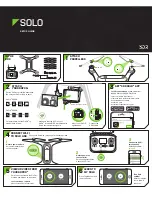
7
Charging Batteries
Caution
Before using any batteries, chargers/balancers, or power supplies, users must first
read the manuals packaged with their equipment. Quanser supplies these guidelines
for charging batteries but it is the users' responsibility to ensure they are operating
their equipment safely and correctly. Quanser is not responsible for any damages
resulting from use of batteries, power supplies, chargers, or balancers.
Before charging or using any batteries observe these safety guidelines:
• Read all instruction manuals for batteries, chargers, balancers, and power supplies.
• Use and store system in a dry environment.
• Do not charge under direct sunlight.
• Do not charge battery when battery feels hot.
• Charge battery away from flammable objects.
• Always be present when charging batteries and do not leave batteries connected to the chargers or the QBall
2 overnight.
• Charge and store LiPo batteries in a location where a battery fire or explosion (including smoke hazard) will
not endanger life or property.
• Keep LiPo batteries away from children and animals.
• Consider how you would deal with a LiPo battery fire/explosion as part of your normal fire safety and evacuation
planning.
• Never charge a LiPo battery that has ballooned or swelled due to overcharging, undercharging or from a crash.
• Never charge a LiPo battery that has been punctured or damaged in a crash. After a crash, inspect the battery
pack for the signs of damage.
• When discarding a LiPo battery, discard it in accordance with your country's recycling laws.
• Never charge the LiPo battery in a moving vehicle.
• Never overcharge the LiPo battery.
• Never leave the LiPo battery unattended during recharging.
• Do not charge LiPo batteries near flammable materials or liquids.
• Ensure that charging leads are connected correctly. Reverse polarity charging can lead to battery damage,
fire, or explosion.
• Have a suitable fire extinguisher (for electrical fires) or a large bucket of dry sand near the charging area. Do
not try to extinguish electrical battery fires with water.
• Reduce risks from fire/explosion by storing and charging LiPo batteries inside a suitable container: a LiPo sack
or metal/ceramic container is advised.
• Monitor recharging LiPo batteries for signs of overheating.
• Protect your LiPo battery from accidental damage during storage and transportation. Do not put battery packs
in pockets or bags where they can short circuit or can come into contact with sharp or metallic objects.
• If your LiPo battery is subjected to a shock (such as a crash) you should place it in a metal container and
observe for signs of swelling or heating for at least 30 minutes.
• Do not attempt to disassemble or modify or repair the LiPo battery.
QBALL 2 - User Manual
36





































